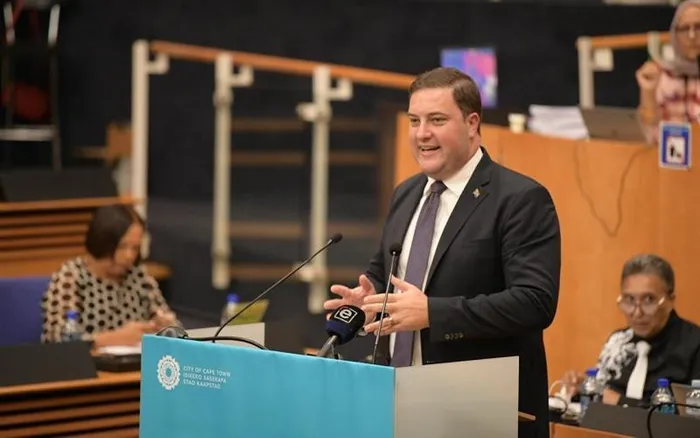Civics slam tariff hikes in City's draft budget

Tariff restructuring reform in the City's draft budget tabled by Mayor Geordin Hill-Lewis draws stark criticism from civic associations
Image: supplied
Civic associations are pushing back against the City’s 2025/2026 Draft Budget due to steep fixed charges, which they say will impose financial strain on middle income homes.
The public has until Friday May 2 to comment on the City’s R84.1 billion draft budget, which Mayor Geordin Hill-Lewis tabled in last month’s council meeting.
The Invest in Hope budget makes provision for infrastructure investment of R39.7bn over three years.
The infrastructure investments include over R16.5bn for water and sanitation, R5bn for electricity grid upgrades, R3.4bn for roads, and a further R4.5bn for the new MyCiti bus route linking Khayelitsha, Mitchell's Plain and a host of other communities with Wynberg and Claremont.
As part of the City’s R6.7bn Safety and Security budget, the mayor said over 700 new municipal police officers will be deployed. These officers will be stationed across every ward citywide.
Mr Hill-Lewis announced major tariff restructuring reforms, which are expected to shield lower income households from financial pressures.
In this reform, water and sanitation fixed charges will now be determined by property values rather than connection size; while electricity rates will rise by 2% on average, compared to Eskom’s 11.32% increase to municipalities nationally.
Residents will also see a City-Wide Cleaning Tariff explicitly reflected on their bills from July alongside Refuse Removal. According to Mr Hill-Lewis, this is not a new expense as customers previously helped fund this via property rates, and the tariff will be fully buffered by the reduction of electricity costs going to other forms of service delivery.
The City has made an online calculator available for residents to view changes to bills commencing on Tuesday July 1.
The steep increases from the tariff restructure have provoked strong opposition from civic associations.
Tokai Residents' Association chairman Don Kourie says the civic organisation is firmly opposed to the tariff restructure, noting that the City’s Tariff Calculator shows a potential 20% increase in monthly rates bills for homeowners.
“The new cleaning tariff is unacceptable — it’s based on property value, yet the service benefits all residents equally, not individual homes,” he says.
“The water connection tariff will also be based on property value. A fixed fee for every property, as there is for refuse collection, rather than a property value-based mechanism, would be more appropriate,” Kourie says, arguing that the current method is inequitable.
“Rates and refuse charges are going up by 7–8%, well above the current 2.8% inflation rate. These new tariffs fail the City’s own promise of equity and fairness. Many residents, especially pensioners on fixed incomes, will face an unfair and disproportionate burden.”
Keith Barton, Bergvliet Meadowridge Ratepayer’s Association, chairman says the draft budget places the burden on middle- and upper-income households with sharp hikes in fixed charges — all tied to property value.
“If approved, this budget will cause financial strain for many middle-income homes. A typical R4.2 million property in our suburbs would pay R920 more per month in fixed charges — irrespective of the amount of electricity and water consumed. Households with solar and boreholes using minimal City services could see monthly municipal bills rise by over 30%.
“The City says this new structure ends the past practice of cross-subsidising other municipal services via electricity sales. We do not believe that municipal charges should be so heavily skewed towards a property’s value instead of its consumption of services.
“However, we believe that, if the City is hell-bent on this method of imposing charges, it should mitigate the effect of the increases by adopting a phased approach that gradually phases out cross-subsidies while incrementally introducing the new fee structure over several years instead of doing this in a single budget cycle,” Mr Barton said.
The City of Cape Town calls it a "Budget of Hope," but for many residents, it will result in financial hardship due to steep increases in municipal bills, says Darryl Lawrence of Kirstenhof.
While the City claims the City-wide Cleaning Tariff is simply a change in how residents fund the service, the increases have far exceeded expectations.
Mr Lawrence points to the draft budget, which shows tariff hikes of over 13% for properties valued at R3m and up to 22.88% — around R1 711 per month—for homes worth R6m. These increases far surpass the 3.2% inflation rate, he says.
Mr Lawrence questions whether the City conducted an affordability study to assess whether residents can manage these hikes, which in some cases could rise as much as 30%.
He also argues that property value is not a fair measure of affordability. Many long-term residents in areas like Tokai and Constantia bought homes decades ago, when prices were much lower, and now face increases they can’t afford.
"It’s unfair to treat all property owners the same, regardless of their financial situation," Mr Lawrence says, calling on the City to revise its budget proposals to avoid placing undue strain on residents.